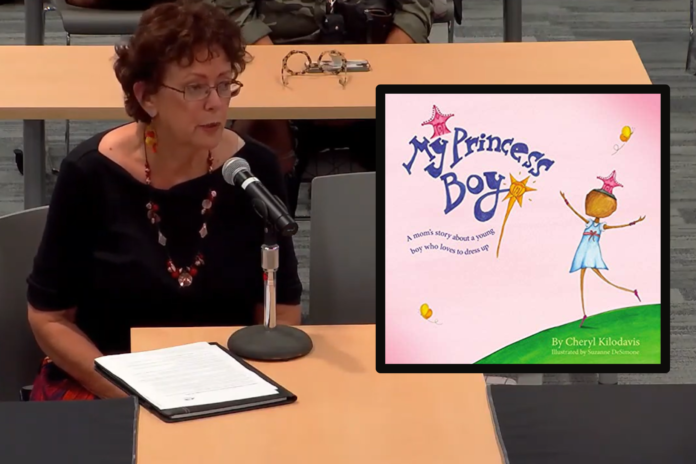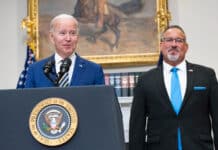
Activists are concerned that Minnesota’s Richfield Public Schools district uses a sexual education program that asks straight students to role play homosexual relationships and teaches kids about anal sex.
Questions about the efficacy of this program were raised by members of the Child Protection League who spoke at a Richfield School Board meeting Monday.
“This type of teaching has no place in our schools,” one speaker said, while another alleged that the district was not transparent with parents about the graphic nature of the curriculum. “Parents are intentionally being deceived and misled about what their children are being taught,” she said.
The specific program in question is called “3Rs,” which stands for “rights, respect, responsibility.” This curriculum was developed by Advocates for Youth, an organization partnered with Planned Parenthood, and was authored in large part by former Planned Parenthood employees.
3Rs is a type of “comprehensive sexual education” (CSE), a term used to describe progressive sex-ed programs that include information about the mechanics of homosexual intercourse, transgenderism, abortion and more. 3Rs uses lectures, classroom activities, slideshows and role-playing games to educate students.
In one series of lessons, 3Rs asks students to role play through various relationship scenarios as part of education on consent and violence prevention.
These scenarios ask students to pair up, pretend they are in gay or lesbian relationships and navigate the process of deciding whether or not to have sex. One activity in the curriculum directs a male student to pretend his name is “Morgan,” a boy who is “very active” in his school’s LGBTQ club, while another student pretends to be “Terence,” a closet homosexual who wants to have sex with Morgan. In this scenario, Morgan plans a secret rendezvous and the two role-playing students are asked to “make a decision about whether to have sex.”
Another of these scenarios has students pretend they are transgender and “make a decision” about having sex with a woman.
This lesson plan includes a note for teachers that explains how straight boys might “have a homophobic response” to being asked to engage in gay role playing.
“Should this happen in your class, it’s important to stop what you are doing, notice the interaction, and ask for the class members to reflect on what’s happening and why. Direct the students back to your class ground rules — and reinforce the agreement to be respectful — and that making homophobic comments is not respectful,” the curriculum reads.
3Rs also begins to teach students about anal sex during the programing designed for students in kindergarten through fifth grade. For this age group, anal sex is discussed in the context of HIV/AIDS prevention, but by the time students are in the upper grade levels, anal sex is routinely listed alongside vaginal and oral sex as one of the normal options for intimacy.
The language of transgenderism is also introduced at the earliest levels of the 3Rs curriculum. In one lesson designed for kindergartners, the teacher is directed to refer to a woman as “a person with a vulva.”
“Referring to people with particular body parts (such as ‘a person with a vulva’) will create a more inclusive classroom than ‘female anatomy,'” the curriculum reads — operating under the assumption that not all people with vaginas are women.
First-graders are also asked to read a picture book called “My Princess Boy,” a controversial story based on a real five-year-old boy’s experiences with cross-dressing.
These are only a few examples of the potentially controversial content in the 3Rs curriculum. The entire set of lesson plans is nearly 700 pages long and available to the public. A 30-page summary of the 3Rs’s most controversial content is also available, composed by a group called “Stop CSE.”
“Programs like 3Rs are not effective,” said Julie Quist, a Child Protection League board member.
“The Institute for Research and Evaluation conducted a comprehensive study on the effectiveness of programs such as this,” she told the Richfield School Board. “Out of 60 school-based studies, no credible evidence of effectiveness was found for sustained reductions in teen pregnancy or STDs. There was no evidence of effectiveness for increasing consistent condom use. Failure rates included 88% failure to delay teen sexual initiation and 94% failure to reduce unprotected sex. 12% of these programs found significant negative effects on adolescent sexual health and/or risk behavior.”
“Claims that explicit sex education has been proven effective are not supported by the evidence,” Quist concluded.
After Quist and her fellow speakers delivered their remarks about the 3Rs curriculum, Chair Tim Pollis offered a response.
“The board does not actually know all the details of our curriculum, I think I can say that with confidence,” he admitted. However, he insisted that all content is “age appropriate” and was selected “in partnership with parents and guardians.”
Alpha News also reached out to the district for comment. “Each year, content is introduced that is age-appropriate,” a district spokesperson said, before restating nearly word for word what Pollis said in the meeting.
Pollis also noted that the district’s use of 3Rs “is not new, it’s been in place for a number of years,” and that “parents are provided opt-out information … in advance … no student is required to participate.”
Alpha News obtained a copy of the form that is sent to parents, giving them the option to exempt their child from 3Rs education.
READ:
